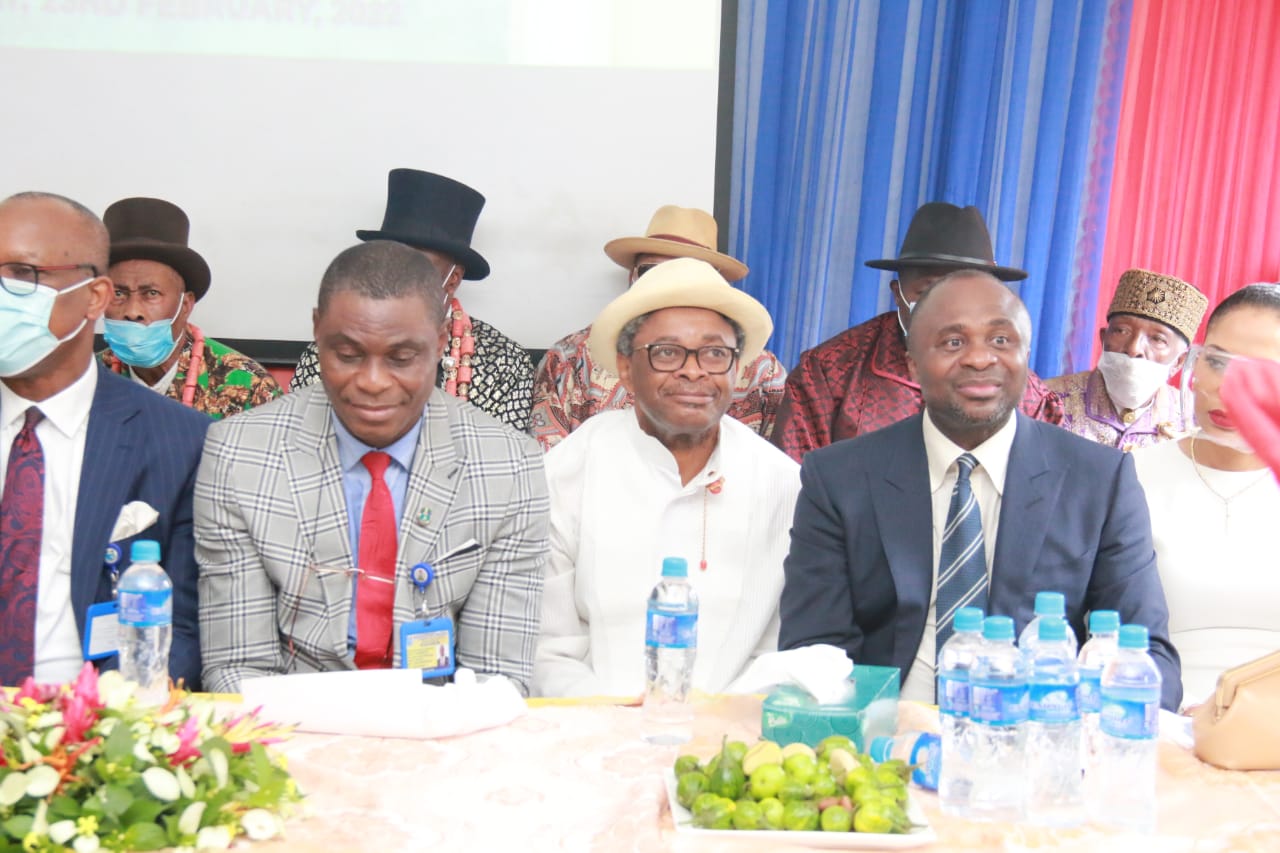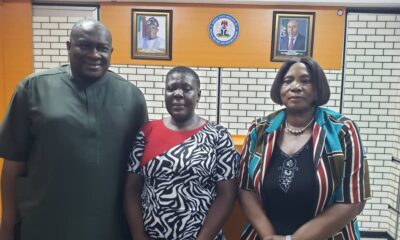News
Capital Importation Rises By 26%, Hits $2.19bn In Q4 -DMO …Says Govt Borrowings Not Bad

The value of capital importation into Nigeria increased by 26.35per cent to hit $2.19billion in the fourth quarter of 2021, according to new data from the National Bureau of Statistics (NBS).
In its ‘Nigerian Capital Importation’ report released, yesterday, the NBS disclosed that capital importation increased from $1.73billion in the third quarter of 2021 to $2.19billion in Q4, 2021.
It said, “The total value of capital importation into Nigeria in the fourth quarter of 2021 stood at $2.19billion from $1.73billion in the preceding quarter showing an increase of 26.35per cent.
“When compared to the corresponding quarter of 2020, capital importation increased by 109.28per cent from $1.05billion. The largest amount of capital importation by type was received through other investment, which accounted for 54.24per cent ($1.19billion).
“This was followed by Portfolio Investment with 29.39per cent ($642.87million) and Foreign Direct Investment amounted to 16.38per cent ($358.23million) of total capital imported in Q4 2021.”
The NBS added that the tanning sector attracted the highest inflow with $645.59million, 29.51per cent of total inflow.
Lagos attracted the most investment, with 90.66per cent ($1.98billion) of total investment flowing to the state.
It said, “Disaggregated by Sectors, capital importation into tanning had the highest inflow of $645.59million amounting to 29.51per cent of total capital imported in the fourth quarter of 2021.
“This was followed by capital imported into the production sector, valued at $360.06million (16.46per cent) and the electrical sector with $325.55million (14.88per cent). Capital Importation by country of origin reveals that Mauritius ranked top as source of capital imported into Nigeria in Q4 of 2021 with a value of $611.45million, accounting for 27.95per cent.
“This was followed by the United States of America and the Republic of South Africa valued at $321.03million (14.67per cent) and $285.83million (13.07per cent) respectively. By destination of investment, Lagos State remained the top destination in Q4 2021 with $1.98billion accounting for 90.66per cent of total capital investment in Nigeria.
“This was followed by investment into Abuja, valued at $170.55million (7.80per cent). Categorisation of total capital investment by the bank shows that Eco Bank Plc ranked highest in Q4 2021 with $708.58million (32.39per cent). This was followed by Stanbic IBTC Bank with $453.82million (20.74per cent) and Union Bank of Nigeria Plc with 284.60million (13.01per cent).”
Similarly, the Director-General of the Debt Management Office, Patience Oniha, has said borrowings by countries to finance budget deficits and critical infrastructure is not necessarily a bad idea.
The DG disclosed this in an interview with newsmen, yesterday, in Lagos, while speaking during an awareness programme on security issuance organised by the Debt Management Office (DMO).
According to her, government borrowings were done by all countries across the world, mostly to finance critical infrastructure, the multiplier effects of which could not be overemphasised.
Oniha reckoned that successive Nigerian governments have had to recourse to borrowing to fund budget deficits, adding that annual budgets would be affected if funds were not raised to support them.
“The issue of debt has become topical in Nigeria that sometimes it almost looks as if borrowing is an offence or a crime. The first thing we must understand is that countries across the world borrow, be it poor countries, advanced countries, developed countries, emerging markets, they all borrow.
“We usually hear complaints that debt levels are rising in Nigeria. Globally, debt levels are rising – not just in Nigeria,” she remarked, stressing that the advent of COVID-19 had also made borrowing imperative for many countries, regardless of size, population, or economic growth.
“What has happened with COVID-19 is that countries needed to spend more, not only on health needs but on social needs as well, because we need to take care of the people who are losing their jobs. We need to create incentives for the private sector to continue operating in order to avoid a big recession because most countries experienced (recession).
“We did as well, but we came out of it after two quarters. Government spending is one of the tools you can use properly to exit a recession,” she affirmed.
The DMO boss clearly made a case for the Federal Republic of Nigeria with regards to financing budget deficits, financing specific projects and services like railways, roads, airports, et al., opining that infrastructural financing is in “itself an economy”, capable of creating enormous jobs across all sectors in the country.
“We also borrow to finance maturing loan obligations like the Federal Government of Nigeria bonds and Nigeria Treasury Bills,” Oniha said, observing, however, certain statutory norms regulating government’s borrowings at various levels and guarding against fiscal impropriety arising from the process.
“The Fiscal Responsibility Act states that borrowing should be for capital purposes and for human capital development.
“The DMO Act is also clear, especially on external borrowings. No arm of government can borrow on its own. It has to conform with those provisions and pass through the Federal Executive Council and the National Assembly,” the DG spotted.
Recently, some stakeholders in Nigeria have raised a stink over the country’s rising debt profile, with some sending strong notes of an ‘impending storm’, as food prices soar even annoyingly higher to the chagrin of the masses, whilst the nation keeps lumbering to meet its local demand for food, staggered by inadequacies, insecurities and most recently the Russia-Ukraine global crisis, which had led to a surge in food prices in most parts of the world.
The DMO had earlier revealed that the country’s total debt stock as of December, 2021, was pegged at a whopping N39.55trillion, ratiocinated to hit N45trillion 2022, just as the government planned to borrow an additional N6.39trillion to finance the 2022 budget deficit.
Oniha had explained that the overall deficit in the 2022 budget was N6.30trillion, representing 3.46per cent of the country’s Gross Domestic Product.
She observed that the budget deficit was to be financed mainly by borrowings from both domestic and foreign sources including privatisation proceeds.
“About N2.57trillion will come from domestic sources; N2.57trillion from foreign sources; N1.16trillion from multilateral and bilateral loan drawdowns, and N90.7billion from privatisation proceeds,’’ she revealed.
News
Fubara Attends PDPGF Meeting In Asaba …..Back Court Verdict On National Secretary Position

Rivers State Governor, Sir Siminalayi Fubara, last Friday, attended the Peoples Democratic Party Governors’ Forum (PDP-GF) meeting in Asaba, the Delta State capital.
The Rivers State Governor, who is the Vice Chairman of the PDP Governors’ Forum, attended the meeting, alongside 10 other Governors of the party’s controlled states across the six geopolitical zones of the country.
The first PDPGF meeting in 2025, was held at the Government House in Asaba, at the end of which a seven-point resolution was reached.
Reading the communique at the end of the meeting, the Chairman of the Forum, and Governor of Bauchi State, Senator Bala Mohammed urged the National Working Committee (NWC) to put every machinery in place to ensure a hitch-free NEC meeting on March 13, 2025.
The communique stated:
“The Forum, having examined all the notices required by law to be given to validly convoke NEC, advised NWC to reschedule NEC to the thirteenth (13Th) of March 2025.”
The Forum further noted the Court of Appeal judgment affirming Udeh Okoye as the National Secretary of the party, saying that as a party that believes in the rule of law, it will respect the position of the Appellate Court on the matter.
“The Forum noted with delight the ongoing efforts at resolving the crisis in the National Working Committee, NWC, on the position of the National Secretary, and has reaffirmed its support for the Court of Appeal judgment; consequently, the Forum advised the NWC to set up the machinery for the effective implementation of the court judgment.
“While commending the country’s valiant and patriotic Armed Forces and Security Agencies for maintaining the frontline in securing the country and the gains of our gallant personnel against bandits in parts of the country, the Forum viewed with deep concern, the resurgence of brazen non-state actors. It, therefore, calls for the strengthening of the nation’s security architecture.”
Governors in attendance include: H.E Senator Bala Abdulkadir Mohammed (Bauchi State); H.E Sir Siminalayi Fubara (Rivers State) – Vice Chairman; H.E Rt. Hon. Sheriff Oborevwori (Delta State) – Host; H.E Dr. Agbu Kefas (Taraba State); H.E Rt. Hon. Ahmadu Umaru Fintiri (Adamawa State); and H.E Dr. Dauda Lawal (Zamfara State).
Others are H.E Senator Ademola Adeleke (Osun State); H.E Senator Douye Diri (Bayelsa State); H.E Pastor Umo Eno Ph.D (Akwa Ibom State); H.E Dr. Peter Mbah (Enugu State); H.E Barr. Caleb Mutfwang (Plateau State);
and H.E Bayo Lawal (Deputy Governor, Oyo State), who represented Governor Seyi Makinde.
News
NGO Implants Free Pacemakers Into 22 Cardiac Patients In PH
A United States based Non Governmental Organisation, Cardiovascular Education Forum, in collaboration with the University of Port Harcourt Teaching Hospital (UPTH), has successfully implanted free pacemakers into 22 patients with different cardiac cases in Port Harcourt.
This is in a bid to save lives and encourage patients with low heartbeats to live longer.
The implantable device, which costs $20,000 each, was inserted free of charge on the selected patients.
Speaking during a Special Hospital Ground Rounds at the UPTH with its Theme, “Recent Advances in Cardiac Pacing,” a cardiac Physiologist, Dr Neil Grub, said the NGO was in Nigeria to improve training and learning on cardiac issues and help patients with cardiac problems.
Accompanied by a team of experts comprising a cardiologist and cardiac device implanter, Dr Jagdeep Siagh, and UPTH interventional cardiologist, Dr Edafe Emmanuel, Dr Grubb said pacemakers were inserted on patients with low heartbeats to boost their heart rates.
Earlier, the Chief Medical Director, UPTH, Prof Henry Arinze Ugboma, said each of the implantable devices cost over $20,000.
Ugboma, represented by the Chairman, Medical Advisory Committee, UPTH, Prof Datonye Alasia, said the partnership between UPTH and the foreign NGO was to build networks, and improve services in terms of healthcare delivery, training and learning.
According to him, there is now a ray of hope in terms of treatment of patients with cardiovascular cases in the hospital.
He said the UPTH started the collaboration with Cardiovascular Education Forum in 2018 to boost health, training and learning on cardiac health.
He assured that, “in coming years, the scale of our collaboration with the mission will be higher.”
Chinedu Wosu
News
FG Unveils National Broadband Alliance To Drive Internet Access
The Federal Government has unveiled the National Broadband Alliance, a new initiative aimed at transforming the nation’s digital infrastructure and boosting connectivity across the country.
The initiative was unveiled yesterday in Lagos by the Minister of Communications, Innovation, and Digital Economy, Bosun Tijani, who was represented by the Executive Vice Chairman of the Nigerian Communications Commission, Aminu Maida.
In his address, Tijani stated that NBAN would significantly enhance broadband penetration, which has grown from just six per cent in 2015 to approximately 42 per cent as of October 2024.
To support this agenda, he said the government was leveraging a Special Purpose Vehicle to deploy 90,000 km of fibre backbone across the nation, connecting underserved and rural communities to high-speed internet.
According to him, the initiative aligns with the Renewed Hope Agenda of President Bola Ahmed Tinubu, which prioritises innovation, technology, and collaboration as key drivers of national prosperity.
Tijani stated that the expansion would not only improve access to reliable broadband but also empower Nigerians, particularly in rural areas.
“While the progress made in broadband penetration is commendable, we recognise that much more needs to be done to ensure every Nigerian can enjoy the benefits of reliable, high-speed internet,” Tijani said.
The minister also emphasised the importance of strategic partnerships with donors, investors, and other key stakeholders in achieving the goals set out in the National Broadband Plan (2020–2025).
He said these collaborations would be essential in overcoming infrastructure development challenges and making broadband affordable and accessible for all Nigerians.
“These targets reflect our unwavering commitment to ensuring that broadband is accessible, affordable, and inclusive for all Nigerians. However, we are also aware of the challenges ahead,” he added.
Tijani stressed that achieving the government’s targets—70 per cent broadband penetration by 2025, a minimum internet speed of 25 Mbps in urban areas, and broadband access for 80 per cent of the population by 2027—will require sustained efforts.
“Achieving these goals will require more than just the efforts of the private sector. It will require a holistic approach that includes strategic partnerships with donors, investors, and other key stakeholders in accelerating the rollout of critical infrastructure,” he said.
-
Business2 hours ago
NDYC Seeks NDDC Commercialisation … Uncompleted Projects Completion
-

 Rivers4 hours ago
Rivers4 hours agoCommissioner Promises Improved Working Conditions … Splashes N.1m On Outstanding Caregiver
-
Sports1 hour ago
Sports: 2nd Edition Of Inter-Tribal Tourney Kick-starts In Mbiama
-
Niger Delta2 hours ago
NACAT Inaugurates South-South Office In A’Ibom Against Corruption
-
Sports43 mins ago
AFCON: Eguavoen, Emenike predict S’ Eagles’ chances
-
Business2 hours ago
Bayelsa Recommits To Infrastructure, Sectoral Dev … Rakes In N227.185b From IGR
-

 News4 hours ago
News4 hours agoS’South Deputy Govs Pay Condolence Visit To A’Ibom Colleague
-

 Niger Delta1 hour ago
Niger Delta1 hour agoHYPREP Presents Scholarship Grants To 300 Ogoni Postgraduate Students

